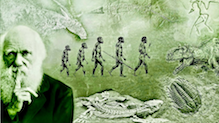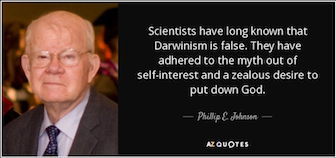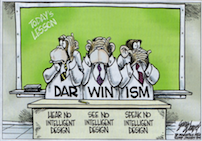Indeed, ever since its publication in 1859 Charles Darwin’s book ‘The Origin of Species’ has caused much debate but has been considered by many to be the only logical/rational explanation as to how life came about: The formation of more complex organisms from simpler pre-existing ones over time through natural selection. However, it must be remembered that Darwin’s theory of evolution is only opinion based. I make this point because many people, such as scientists, make ‘leaps of faith’ in the theory by sometimes stating, in so many words, that it’s a fact.
Everywhere I go the bookshops shelves are stacked with many authors supporting Darwin’s theory in their work with hardly anything to be found that challenges. In spite of this there are a number of excellent books challenging the theory such as Michael Denton’s ‘Darwin a Theory in Crisis’ and ‘Shattering the Myths of Darwinism’ by Richard Milton, and no doubt, both authors have created a stormy debate…

Like others writing against Darwinism, do they expose the fact that Darwin’s book The Origin of Species has holes in the plot?
I wrote this out of concern. In light of a lack of publicity or absence in the education system not looking at the alternative explanations and challenges to Darwinism I strongly suspect that the hidden powers that shouldn’t be have chosen to promote Darwin’s theory because it serves their scientific, social and political agenda to manipulate and control the masses:
It promotes the materialistic idea that it’s all about the ‘survival of the fittest’ in a competitive world… this competition brainwashing and mindset suits them to a tee, and then there’s the idea of atheism, that we are here by accident, are not spiritual and there’s is no God…

So, here are just some of my questions challenging Darwin’s Theory of Evolution. Remember, the definition of evolution is the formation of more complex organisms from simpler pre-existing ones over time through natural selection.
Q1. Evolution should be occurring now, but there are no forms seen in the transitional state today looking like a cross between the old species from which they have evolved and the new species they will become. For examples, it has been said that a bird evolved from a reptile, so where today can we see the ‘repirds’ or taking the case of a chimp and human, where are the ‘hupanzees’?
Q2. Where are the fossilized missing links as evidence to show evolution occurring in the past as proof that there existed those transitional intermediates?
Q3. On the subject of today, scientists have taken rapidly reproducing organisms such as bacteria and fruit flies with their short life-cycles and have manipulated their genes (mutations) and made environmental changes, but have not observed any new species from their efforts with these organisms. Why didn’t the manipulated mutations and the environmental changes over the many, many generations produce new species?
Q4. Doesn’t this mean that scientific experimentation and investigation cannot show evolution in action so evolution is not a science?
Q5. Carrying on from Q4, even though different species do have similarities like chimps and humans why has there never been any real explanation given to explain their strikingly obvious differences?
Q6. Many hark at those pointing out similar genetic, embryonic and physical resemblances between species, for example, when comparing chimps and humans. However, there are no fossil records to show the transition of one species to the other over time… so the claim that they had originated from a common ancestor cannot be proved (Q2 where are the so-called ubiquitous missing links?!) … Isn’t it therefore reasonable to suggest intelligent design since any designer would take similarities and make minor modifications…?
Q7. Why do the school biology text books never outline ANY of the creditable alternative explanations challenging evolution? The content on evolution is therefore cherry picked. For one of many examples, the school biology text books list genetic similarities pointing out that evolution was the reason for changes in species using respective comparisons between chimps and humans, wolves and dogs…etc as examples. However, it’s never pointed out that unlike the above there are many comparisons that are far from clear cut. For examples, it’s never mentioned that cows are more genetically related to dolphins than horses, while the insectivore elephant shrew is more genetically related to the elephant… the contradictory list goes on…
Q8. The 2nd law of thermodynamics states that in nature everything naturally goes toward disorder or disorganisation (entropy). Taking this proven universal law of nature into account, and nothing has ever been shown to go against it; doesn’t it mean therefore evolution could never have happened?
Mathematical improbability
Imagine walking down the street and finding a lost lottery ticket on the sidewalk and in that week winning the jackpot with it. Then, next week you find another lost lottery ticket that goes on to win the jackpot again. The same thing happens over 7 consecutive weeks… This would never happen in real life. The chances of it happening are statistically too high… hence the saying it’s a mathematical improbability. Bearing this in mind:
Q9 Mutations are usually harmful or neutral. The advantageous mutations for natural selection are few and far between. So, doesn’t the idea of evolution occurring through these rare advantageous mutations to the environment make it a mathematical improbability?
Q10.Carrying on with Q8 and to use an example to clarify. A designer engineer knows that he/she needs to have a high percentage completion on the assembling of a product before it starts to become functional. For instance, let’s say for arguments’ sake a certain car needs to be about 85% parts assembled before it starts to become functional. Okay, the car may be sluggish and have many glitches in its running but after, when the other 15% parts are assembled, it will be fully and smoothly functional…
Now, in light of this, as an example, consider the evolution of a pair of lungs. The first, say, roughly 85% of the formation of a pair of lungs would not only have to come about blindly without any function and have no advantages to the environment for it to be selected for, but also get selected from mutations that are not harmful or neutral… so once again, my question; is this so unlikely to happen (never) that it’s a mathematical improbability?
Q11. The human genome project at the turn of this millennium gave some interesting results. One of those was the finding that a significant percentage of chemical composition in the genome was not found common in the environment. If evolution was true, our genome would be purely be made up of environmental materials only, so where did this unknown composition come from?
Q12. Can you give one example where the genetic information in an organism has been seen to increase by a mutation or evolutionary process?

I could indeed ask many more questions challenging Darwin’s theory but I’ll leave it there. I hope I’ve encouraged the reader to keep questioning everything including Darwinism.
You might like:
